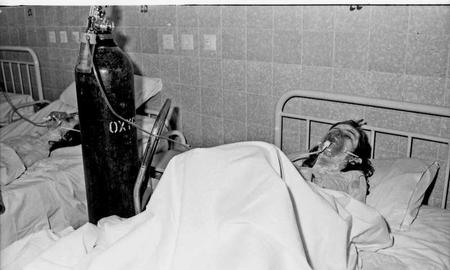After decades of leading the fight against the use of chemical weapons, Iran has betrayed its values in support of Syrian president Bashar al-Assad.
On Thursday, June 27, Iran and Russia, Syrian President Bashar al-Assad’s main allies, voted against expanding the power of the Organisation for the Prohibition of Chemical Weapons (OPCW) to make it possible to assign blame for chemical attacks. Despite the opposition of the three countries, however, member states of the watchdog organization voted 82 to 24 in favor of expanding its mandate “to identify the perpetrators of the use of chemical weapons.”
Iran’s vote coincided with the 31st anniversary of the Iraqi chemical attack on the Iranian Kurdish town of Sardasht in 1987. The attack resulted in the excruciating deaths and injuries of thousands of Iranian citizens. “The name Sardasht, like Ieper and Halabja, has become a powerful reminder to the international community that the use of chemical weapons cannot be tolerated – not then, not now, not ever,” announced Ahmet Üzümcü, Director General of the OPCW on the occasion of the anniversary.
This makes the Islamic Republic’s opposing vote all the more surprising. For years, Iran has been vociferous in its opposition to chemical weapons. But now officials appear to be trying to justify its support for Syria’s behavior by accusing the West of driving an underhand agenda. In his speech to OPCW members, Alireza Jahangiri, Iran’s ambassador to the Netherlands and its representative to the Netherlands-based OPCW, said: “The West is publicizing obligations of the OPCW to mislead the organization from its duties.” And Russia announced that it would not recognize the new powers granted to the group.
Prior to the resolution passed on June 27, the OPCW could only confirm that chemical attacks had taken place, but had no power to identify those responsible.
The organization is not part of the United Nations, but it does provide services to the UN in its fight against chemical weapons. For example, through its fact-finding missions, the OPCW has confirmed chemical attacks took place in Syria, although it has not named the suspected responsible party, i.e., Bashar al-Assad’s government, because it was not authorized to do so. In April, following reports of chemical attacks, western members of the UN Security Council drafted a resolution to condemn the Syrian government for crimes against its own people, but Russia vetoed the resolution.
Russia has consistently blocked international organizations’ efforts to hold Syria accountable. Russia’s latest veto prompted Britain to initiate proceedings to expand the authority of the OPCW. However, both Iran and Russia, joined by Syria, did their best to block the UK’s initiative.
Flag-Bearer against Chemical Weapons?
Russian citizens have not been victims of chemical attacks — but Iranians have. Thousands were killed or maimed by Saddam Hussein’s chemical attacks. Traditionally, the Islamic Republic has claimed to be the flag-bearer against these weapons of mass destruction.
During the eight years of the Iran-Iraq War in the 1980s, Iran unrelentingly questioned the values of western countries that had provided Saddam Hussein with chemical weapons, challenging their claim that they upheld human rights. Iranian officials criticized these countries for ignoring Iranian complaints to the United Nations, and for not using the powers of the Security Council against the Iraqi dictator in his use of chemical weapons. The Iranian government even affixed a plaque outside the German embassy in Tehran, holding Germany accountable for providing chemical weapons to Saddam Hussein.
Chemical weapons were first used in World War I. The victims of such weapons, even if they are not killed outright, continue to suffer permanent injuries including respiratory and alimentary failures, blindness and skin cancer. According to the Iranian Organization for Victims of Chemical Attacks, during the 1980s war, Iraq launched 3,500 chemical attacks on Iran.
Thirty-five years after the end of the war with Iraq, war veterans continue to suffer from the effects of chemical weapons. Many victims have never fully recovered their health and occasionally the media publishes news of their deaths from these ongoing conditions. Today, the use of chemical weapons in considered a war crime, whether committed by an individual or a government. And with the new powers granted to the Organisation for the Prohibition of Chemical Weapons, it will become easier to prosecute those responsible for using chemical weapons.
One of the main judicial venues to deal with the issue is the International Criminal Court in the Hague. According to international laws, using chemical weapons is on a par with crimes against humanity, genocide and war crimes.
For almost 40 years, the Islamic Republic of Iran has been arguing that the fight against chemical weapons is a necessity, as is bringing to justice those who use such weapons. But on June 27, at a moment when Iran could have achieved its historical aim, the country that lost so many people to chemical attacks betrayed its declared principles and stood by the Syrian government to save Bashar al-Assad from the possible consequences of its use of chemical weapons.
The OPCW can now identify those guilty of using chemical weapons despite Iran’s vote. But Iran’s justifications for its decisions amount to a step backward in the country's stand against chemical weapons, its advocacy for the punishment of those who use such weapons and its fight to prevent such crimes against humanity ever happening again.
The Islamic Republic of Iran had a chance to stand with the world community in protecting human rights by fighting against chemical weapons. Instead, Tehran chose to stand on the wrong side of history by siding with the Syrian government.
visit the accountability section
In this section of Iran Wire, you can contact the officials and launch your campaign for various problems


























comments